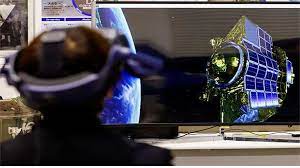TOKYO (Reuters): Japan’s space agency on Saturday said it was examining the communication with its probe after it landed on the moon, during an attempt to become the world’s fifth country to achieve a moonshot and revitalise a space programme that suffered recent setbacks.
The Japan Aerospace Exploration Agency (JAXA) said the Smart Lander for Investigating Moon (SLIM) landed the moon’s surface at around 12:20 a.m. (1520 GMT Friday) but it was still confirming the communication with the probe.
Dubbed the “moon sniper”, SLIM attempted to land within 100 metres (328 feet) of its target, versus the conventional accuracy of several kilometres.
JAXA says this landing technology will become a powerful tool in future exploration of hilly moon poles seen as a potential source of oxygen, fuel and water – factors necessary to sustain life. It will take up to a month to verify whether SLIM had achieved the high-precision goals, JAXA has said.
The Soviet Union, the United States, China, and India are the only four countries that have successfully carried out soft landings on the moon.
Japan is increasingly looking to play a bigger role in space, partnering with ally the United States to counter China. Japan is also home to several private-sector space startups and the JAXA aims to send an astronaut to the moon as part of NASA’s Artemis program in the next few years.
But the Japanese space agency has recently faced multiple setbacks in rocket development, including the launch failure in March of its new flagship rocket H3 that was meant to match cost-competitiveness against commercial rocket providers like SpaceX.
The failure caused widespread delays in Japan’s space missions, including SLIM and a joint lunar exploration with India, which in August made a historic touchdown on the moon’s south pole with its Chandrayaan-3 probe.
JAXA has twice landed on small asteroids, but unlike with an asteroid landing, the moon’s gravity means the lander cannot pull up for another try, its scientists said. Three lunar missions by Japanese startup ispace, Russia’s space agency and American company Astrobotic have failed in the past year.







